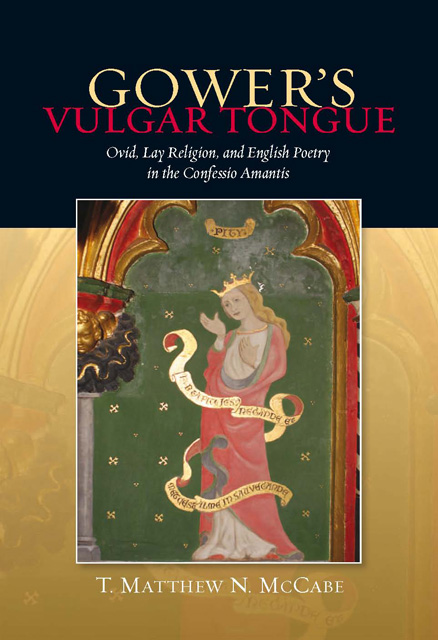Book contents
- Frontmatter
- Contents
- Acknowledgments
- Note on Abbreviations and Editions
- Abbreviations
- Introduction: Vernacularity and Public Poetry
- 1 Gower’s Ovidian Voice in English
- 2 English Writing and Lay Theology
- 3 At the Limits of Clerical Discourse
- 4 Kinde Grace
- 5 Ethics, Art, and Grace
- Conclusion: Gower and Public Poetry
- Bibliography
- Index
5 - Ethics, Art, and Grace
Published online by Cambridge University Press: 14 February 2023
- Frontmatter
- Contents
- Acknowledgments
- Note on Abbreviations and Editions
- Abbreviations
- Introduction: Vernacularity and Public Poetry
- 1 Gower’s Ovidian Voice in English
- 2 English Writing and Lay Theology
- 3 At the Limits of Clerical Discourse
- 4 Kinde Grace
- 5 Ethics, Art, and Grace
- Conclusion: Gower and Public Poetry
- Bibliography
- Index
Summary
The central claim of the previous chapter that Gower depicts grace as ready at hand, virtually immanent within Nature, seems finally belied by Amans’s failure at the end of the poem to obtain “grace” in love. Unlike Pymaleon, Iphe, and Alceone, that is, Amans must abandon his cause and make a “beau retret” (VIII.2416). If, as I have argued, the residual optimism of Genius’s amatory doctrines signifies the immanence of grace much less by way of allegory than, more proximately, by way of an organic analogy that affirms the goodness of both earthly love and spiritual grace, it is neccessary to consider how far this reading needs qualification in light of the eventual denial of Amans’s suit. This chapter considers the trajectory of the entire confession leading up to this moment and interprets the failure of Amans’s suit in love as an affirmation that Nature’s goodness has limits. More directly relevant to my task of defining the vernacularizing tendencies of the Confessio, the chapter also argues that the failure of the confession—a wide-ranging dialogue that affords opportunities to try and find wanting a very wide array of discourses—confirms the limited efficacy of human language and discourse in general. Gower represents Amans’s final and, at long last, now overtly spiritual lesson as only possible because of Amans’s natural course in the body. The goodness of the natural returns, and with it, the possibility of a markedly lay spirituality.
Ethics, Art, and Textual “Experience”
In chapter 4 we considered the very great contribution that Ovidian metamorphosis makes to the vernacular rhetoric of the Confessio. This chapter considers the related contribution of Ovid’s discourse of love. I argue that the Confessio draws on the Ovidian and medieval art of love not only for the content of its amatory advice and for its “comic strategy” in giving advice in the voice of the fallible narrator Genius, but, more fundamentally, for its self-conscious play upon its own dubious epistemic status—that is, on the impossibility of an “art” of love. By couching his most public discussion of ethics in terms borrowed from the art of love, Gower suggests that no discursive account of ethics is sufficient to bring about moral reform that the world needs. Especially in an Aristotelian framework, ethics is not finally motivated toward learning doctrines, but toward practice in the ever-changing situations of embodied experience.
- Type
- Chapter
- Information
- Gower's Vulgar TongueOvid, Lay Religion, and English Poetry in the <i>Confessio Amantis</i>, pp. 192 - 226Publisher: Boydell & BrewerPrint publication year: 2011

